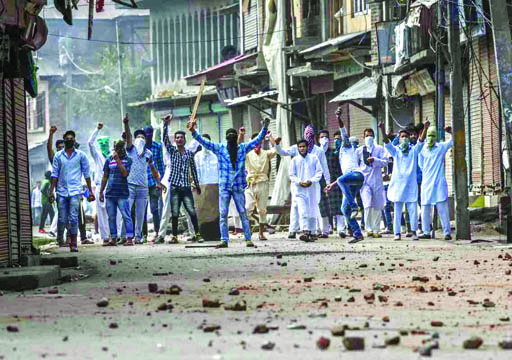The sulkers & the promising helmsman
- By : Anirban Ganguly
- Category : Articles

While some latently promote separatism in the state, Narendra Modi has displayed firm resolve in battling the J&K crisis.
It is the time for sulk-induced irresponsible utterances. Let us sample a few such expressions. Yashwant Sinha, a former union foreign minister and finance minister breaks bread with separatists and India wreckers in the Valley and declares irresponsibly that Kashmir has been emotionally lost. That a former foreign minister, who has held many responsible posts in the government and in the party to which he claimed to belong can bat for separatism, having taken an oath on the Constitution of India in the past, demonstrates the depth of rootlessness and the magnitude of his loss of perspective.
Over the last two years or so, Yashwant Sinha has been going to the Valley, heading a motley group of activists and agenda pushers to make a show of reaching out to a cross-section and returning to mouth positions, which are often articulated by separatists including those interest groups who do not wish for the people of Jammu & Kashmir to have equal opportunities. From sulk to separatism is how Yashwant Sinha’s politics can now be defined. He does not speak for the jawans of our armed forces who are fighting terrorists in the Valley and making decisive inroads against their subversive agenda, he does not speak for the aspirations of the countless youths of the state who dream of opportunities, he does not speak for the ordinary citizens of the state who have dared to defy the dictates of separatists, he speaks for himself and for those who wish to see India disintegrated. Sinha had no word of sympathy or condolence for the young and dynamic BJP leader from Shopian, Gowhar Ahmed Bhatt, who was found with his throat slit just because he aspired to be active in public life and participated in constructive democratic politics.
Another former Union Finance & Home Minister, P Chidambaram, displayed a similar, astounding irresponsibility when he uttered his unsolicited advice of accepting the demand of “azaadi” in the state. For a leader who could not save his seat, whose tenure as Finance Minister was disastrous and saw some of the worst corruption scandals wrecking apart our polity, such facetious advice was rich indeed. Being out of power does affect the capacity of sane thinking, rational and measured judgment in some, especially those whose political adversary happens to be Narendra Modi. They can plummet to any depth driven by their blind opposition to Modi. Prime Minister Modi rightly called these “azaadi” promoters as traitors, only those who have in the past failed in their duties to protect India’s sovereignty are the ones who are feeling flustered by this remark. Many of them are disconcerted to see India under Modi win the fight against terror; a fight that, they themselves, when in power, had dealt with meekly.
The other day, former Jammu & Kashmir Chief Minister Farooq Abdullah, who in the last four decades or so, has often decided to gift away chunks of the state to Pakistan, decided once more to exercise his self-arrogated dynastic prerogative in the state and asked Pakistan to keep the chunk of Indian territory that it had illegally and insidiously occupied in 1947.
The Abdullahs have always played this game and it is our duty to dutifully remind them that the state of Jammu & Kashmir is not their fief, handed to them in a platter by their ancestors, and they function within the purview of the Constitution of India and the Indian Parliament, and that his statement, asking Pakistan to keep the occupied portion of the state is tantamount to sedition and is a betrayal of the spirit of Indian unity and of democracy. Farooq Abdullah is also a former Union Minister and his utterances display his increasing loss of propriety and public sense. One never hears the Chidambaram’s, Sinha’s and Abdullah’s take on Pakistan or its patronised terrorists and their fronts—intellectual, academic, or NGOs.
The 12th edition of former Governor of Jammu & Kashmir Shri Jagmohan’s opus, “My Frozen Turbulence in Kashmir”, has just appeared. A personality of vast erudition and insight with a lifelong commitment to the state and the country, Jagmohan does not sulk, is not irresponsible in his statements, and in his assessment, Prime Minister Modi’s “new resolve” to handle Pakistan displays renewed energy and dynamism. He describes, succinctly the “ingredients of the new resolve”, “clearly, by the very nature of challenges to be tackled”, writes Jagmohan, “the new resolve had to be multi-directional, both in concept and ground-level application. Its fulcrum was to be offensive-defensive approach which would cover not only the sphere of internal security but also the connected spheres of diplomacy and economic relations etc…” in fact, this is the manner in which an element like Pakistan, which he terms, as the “supermarket of terror commodities” ought to handled and isolated. Jagmohan’s “analysis of the events of 33 months of Narendra Modi regime” leads him to “assert with a fair degree of reasonableness, that India which, in relation to the Kashmir issue, has been suffering, for years together, ‘trials and judgments’ of a turbulent sea, has found a promising helmsman. He has shown the calibre to chart out a new sea-lane. He remains confident even when this lane is crossed by heavy winds and ominous clouds…”
Abandoning the sulkers and naysayers, I would trust my “promising helmsman” to successfully sail us through…

















